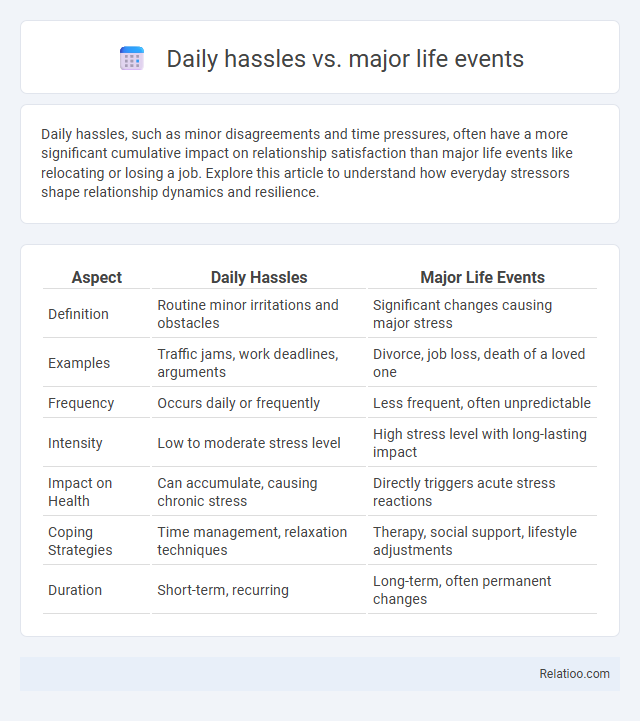Daily hassles, such as minor disagreements and time pressures, often have a more significant cumulative impact on relationship satisfaction than major life events like relocating or losing a job. Explore this article to understand how everyday stressors shape relationship dynamics and resilience.
Table of Comparison
| Aspect | Daily Hassles | Major Life Events |
|---|---|---|
| Definition | Routine minor irritations and obstacles | Significant changes causing major stress |
| Examples | Traffic jams, work deadlines, arguments | Divorce, job loss, death of a loved one |
| Frequency | Occurs daily or frequently | Less frequent, often unpredictable |
| Intensity | Low to moderate stress level | High stress level with long-lasting impact |
| Impact on Health | Can accumulate, causing chronic stress | Directly triggers acute stress reactions |
| Coping Strategies | Time management, relaxation techniques | Therapy, social support, lifestyle adjustments |
| Duration | Short-term, recurring | Long-term, often permanent changes |
Understanding Daily Hassles and Major Life Events
Daily hassles are routine, minor annoyances such as traffic jams and misplacing items that accumulate and impact your overall stress levels. Major life events, including moving, starting a new job, or losing a loved one, are significant changes that demand substantial adjustment and can cause intense stress. Understanding the distinction between daily hassles and major life events helps you manage your stressors more effectively by addressing both small, frequent irritations and significant, less frequent challenges.
Key Differences Between Daily Hassles and Major Life Events
Daily hassles refer to routine, minor irritations such as traffic jams, work deadlines, or household chores that cause frequent but low-intensity stress. Major life events are significant occurrences like marriage, divorce, or job loss, which trigger intense stress but happen infrequently and require substantial adjustment. Stressors encompass both daily hassles and major life events, representing any external demands that disrupt an individual's psychological or physiological balance.
Common Examples of Daily Hassles
Common examples of daily hassles include traffic jams, minor arguments, work deadlines, and misplacing keys, which create frequent, low-level stress impacting overall well-being. Unlike major life events such as divorce, job loss, or serious illness, daily hassles accumulate and can significantly affect mental health over time. Stressors represent any internal or external demands causing stress, with daily hassles being recurring micro-stressors contributing to chronic stress.
Typical Major Life Events People Experience
Typical major life events people experience include marriage, divorce, job loss, relocation, and the death of a loved one, each significantly impacting mental health and well-being. Unlike daily hassles, which are minor irritations like traffic jams or misplacing items, major life events demand substantial emotional adjustment and coping resources. Understanding these stressors helps you prioritize self-care and seek support during critical transitions.
Psychological Impact of Daily Hassles
Daily hassles, minor irritations and routine challenges, accumulate to exert significant psychological impact by increasing levels of chronic stress and reducing overall emotional well-being. Unlike major life events, which cause acute but episodic stress, daily hassles contribute to persistent feelings of frustration and anxiety, impairing cognitive function and resilience. Stressors of this nature disrupt daily functioning and can lead to long-term mental health issues, emphasizing the need for effective stress management strategies focused on everyday experiences.
Emotional Effects of Major Life Events
Major life events, such as the loss of a loved one or job termination, often trigger intense emotional reactions including grief, anxiety, and depression. These stressors can disrupt psychological equilibrium more profoundly than daily hassles, which cause milder but more frequent emotional irritations. Understanding the emotional effects of major life events is crucial for developing effective coping strategies and mental health interventions.
Coping Strategies for Daily Hassles
Daily hassles, unlike major life events or significant stressors, involve routine challenges such as traffic, work deadlines, or minor arguments, which cumulatively impact psychological well-being. Effective coping strategies for daily hassles include problem-solving techniques, time management, and seeking social support to reduce their negative effects. Mindfulness practices and cognitive reframing also enhance resilience by helping individuals manage everyday stressors more adaptively.
Managing Stress from Major Life Events
Managing stress from major life events requires targeted coping strategies due to their intensity and lasting impact compared to daily hassles or minor stressors. You can benefit from approaches such as seeking social support, practicing mindfulness, and developing problem-solving skills to effectively reduce emotional strain. Prioritizing self-care and professional counseling also enhances resilience and facilitates adjustment during significant life changes.
The Cumulative Effect of Daily Hassles vs Major Life Events
Daily hassles, small irritations such as traffic jams and minor disagreements, accumulate over time to create significant stress that can surpass the impact of major life events like job loss or bereavement. Research indicates that while major life events trigger intense but short-lived distress, the persistent strain from daily hassles contributes to chronic stress affecting mental health and well-being. The cumulative effect of daily hassles often leads to sustained physiological responses, increasing the risk of stress-related illnesses more than isolated major life events.
Building Resilience Against Everyday and Major Life Stressors
Daily hassles, such as traffic jams and minor arguments, constantly challenge your emotional stability, while major life events like job loss or bereavement impose significant psychological strain. Building resilience involves developing coping strategies that address both types of stressors by fostering emotional regulation, enhancing problem-solving skills, and seeking social support. Understanding the distinct impact of daily and major stressors allows you to strengthen your adaptability and maintain mental well-being under varied pressures.

Infographic: Daily hassles vs Major life events
 relatioo.com
relatioo.com